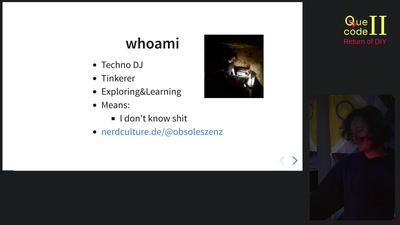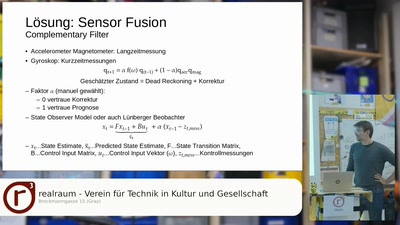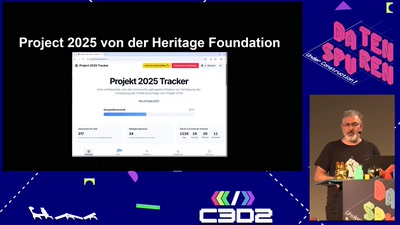Feed cleverhans-blog [copy] http://www.cleverhans.io/feed.xml has loading error: cURL error 22: The requested URL returned error: 404
Liberating DJing from Mega Corps (quellcode25)

Introducing a fresh'n tiny DJing Software for Linux to battle the enshittification of DJing The art of DJing has been shifting and progressing over the last 2 decades by the introduction of digital djing. But since then it has been in the greedy hands of a couple of big players, namely Pioneer (now AlphaTheta). Cloud & subscription is now on the plate, with hefty price tags. Time to liberate the Art of DJing from those evil Mega Corps! Out of this struggle I've been hacking on a tiny DJing software over the last years and I...
Safety Without Surveillance: Designing Digital Sovereignty for All Ages
In September, a single misconfiguration in Life360’s Android API turned a “family safety” app into a map of human lives exposed. More than 442,000 users had their precise GPS trails, names, and phone numbers dumped online by a threat actor known as Emo.
The post Safety Without Surveillance: Designing Digital Sovereignty for All Ages appeared first on Purism.
Kalman Filter und Sensor Fusion (realraum)

Ein kurzer Vortrag, der die Vor- und Nachteile einzelner Sensoren aufzeigt, was die Entwicklung der Sensor Fusion motivierte. Es wird ein Überblick geschaffen, wie man vom einfachen Complementary Filter zum Kalman Filter kommt und wie man diesen adaptiert um nichtlineare Zustände zu berechnen. Diese Erweiterung ist als Extended Kalman Filter bekannt, die in den meisten Anwendung der Navigation und Orientierungsbestimmungen von Flugzeugen zum Einsatz kommt.
https://creativecommons.org/licenses/by-sa/4.0/
about this event: https://c3voc.de
Video:realraum-56371-deu-Kalman_Filter_und_Sensor_Fusion_hd.mp4
GNUnet 0.25.1
GNUnet 0.25.1
This is a bugfix release for gnunet 0.25.0. It fixes some regressions and minor bugs.
Links Source: https://ftpmirror.gnu.org/gnunet/gnunet-0.25.1.tar.gz ( https://ftpmirror.gnu.org/gnunet/gnunet-0.25.1.tar.gz.sig ) Detailed list of changes: ...
Secret Service Telecom Bust Exposes Cellular Weaknesses
The Secret Service’s disruption of a massive SIM-server network near the U.N. is proof that the threats to our communications are real, organized, and capable of overwhelming public safety systems.
The post Secret Service Telecom Bust Exposes Cellular Weaknesses appeared first on Purism.
Purism Approach vs. Google Model
The Justice Department and a coalition of states are pursuing antitrust action against Google, accusing it of running monopolistic ad-tech systems that exploit users and lock out competition. Regulators are weighing remedies that could force structural changes to Google’s ad empire.
The post Purism Approach vs. Google Model appeared first on Purism.
Музыка в кейгенах

Одна из самых ностальгических около-компьютерно-музыкально-чиптюновых тем — музыка из «кряков» и «кейгенов». Думаю, все мы знаем, как она звучит, а многие даже качали и слушали коллекцию в поисках той самой запомнившейся мелодии из дней нашей юности, проведённых в бесконечном рубилове в какую-нибудь любимую компьютерную игрушку.
Но откуда она взялась, сама эта музыка? Почему она именно такая и звучит именно так? Как вообще возникла традиция её использовать? Уверен, кто-то где-то уже рассказывал, ибо это база, но повторение — мать учения, а также бальзам для ностальгии. Обмажемся же им поскорее!
Читать далееLibrem PQC Encryptor: Future‑Proofing Against Both SS7 and Quantum
Signaling System 7 (SS7) was designed in the 1970s to let telecom carriers route calls, deliver SMS, and enable roaming. It was never built with authentication or encryption in mind. Security wasn’t part of the plan. The assumption was simple: All carriers are trusted.
The post Librem PQC Encryptor: Future‑Proofing Against Both SS7 and Quantum appeared first on Purism.
Shortwave App Now Available
Shortwave is an internet radio player that provides access to a station database with over 50,000 stations.
The post Shortwave App Now Available appeared first on Purism.
The End of the World as we know it? (DS2025)

Wie TechBros die Zukunft planen und weshalb wir diese Zukunft stoppen, um Planeten & Gesellschaft zu erhalten Moderne Technologie wie „KI“ werden uns durch eine Vielzahl an Versprechen schmackhaft gemacht: Die künstliche Intelligenz macht alles noch viel besser. Fortschritt, permanente Verbesserungen, die beste Zukunft aller Zeiten. Beim näheren Hinsehen sind diese Versprechen aber extrem unkonkret: Wohin wir durch die Nutzung dieser Technologien fortschreiten, für wen sich alles permanent verbessert und wie viele von uns an der als beste Zukunft beschriebenen Zustand teilhaben dürfen, wird nie erklärt. Wer diese Versprechen hingegen nicht begeistert umarmt gilt schnell...